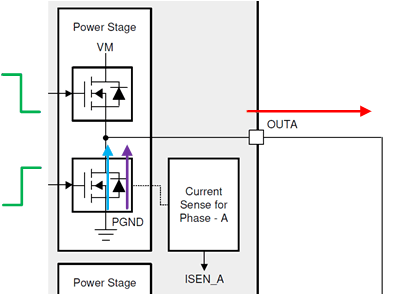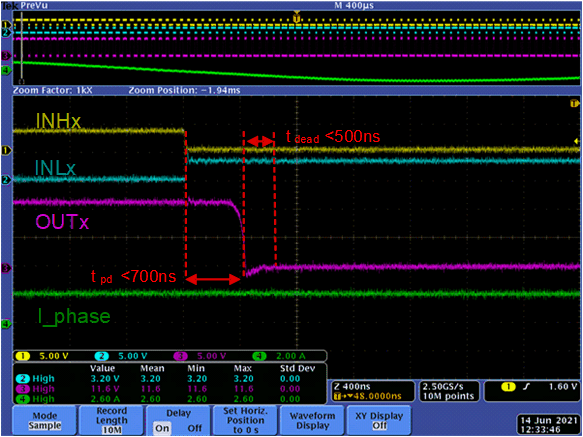SLVAF84 September 2021 DRV8311 , DRV8312 , DRV8313 , DRV8316 , DRV8332 , MCT8316Z
2.2 INHx Falling, INLx Rising, Current is Going Out of the Phase
In Figure 2-5, when INHx goes low (green), current is again momentarily pulled through the body diode (purple) of the LS FET to continue sourcing current out of OUTx (red). After a short body diode conduction period, the LS FET begins to conduct (blue).
 Figure 2-5 Current Switching With INHx
Falling, INLx Rising, and Current Out of OUTx
Figure 2-5 Current Switching With INHx
Falling, INLx Rising, and Current Out of OUTxNote how the current direction is the same internally between the body diode of the LS FET and the conduction path of the LS FET. The device can turn on the LS FET instead of allowing the body diode to fully conduct because the current direction is the same. This results in a shortened propagation delay and dead time.
The example waveform in Figure 2-6 shows INHx falling and INLx rising and current is going out of the phase (positive current in green) for the DRV8316 with a slew rate of 200 V/µs and sinusoidal commutation. The dead time and propagation delay minimum values in the DRV8316 data sheet specifications are not specified because of this condition due to the internal VGS handshaking feature of the device to avoid any shoot-through conditions.
 Figure 2-6 Waveforms of Dead Time and
Propagation Delay When INHx is Falling, INLx is Rising, and Current Flows Out of
OUTx
Figure 2-6 Waveforms of Dead Time and
Propagation Delay When INHx is Falling, INLx is Rising, and Current Flows Out of
OUTx